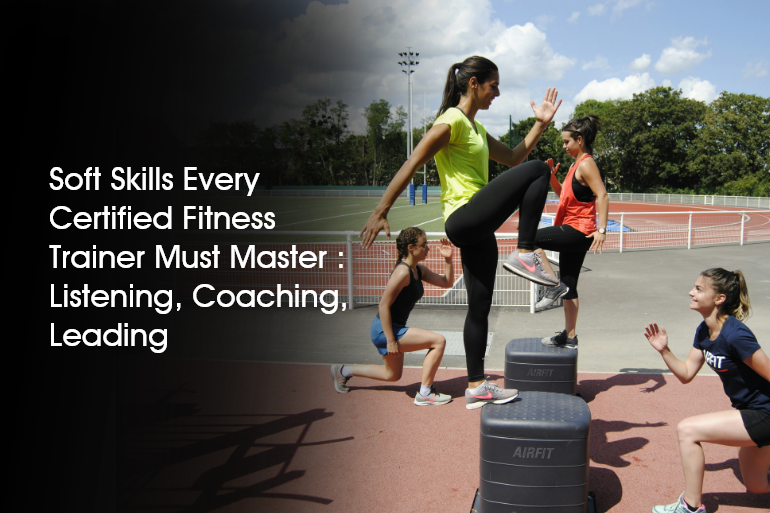.png)
- info@fitindiatrust.org
- +91-7999567519

Soft Skills Every Certified Fitness Trainer Must Master: Listening, Coaching, Leading
Soft skills are personal characteristics, the skills of the individual, and communication abilities, which are based on emotional intelligence rather than knowledge.
The qualities and skillsets of a fitness trainer are limitless and tricky to figure out for an individual who is new to the fitness industry. Therefore, it is important to focus on the soft skills for fitness trainers for long-term success in the fitness industry.
These soft skills are often ignored by individuals, but they are basic skills, so they are very important. The soft skills have an important role in determining success and failure. These are the skills that provide the ability to interact with clients.
Soft skills help to improve the overall well-being of the clients by helping them to become more confident and achieve their goals. In this blog, we will highlight the must-have soft skills for fitness trainers for their success.
Must-have Soft Skills for Fitness Trainers
For long-term success in the fitness industry, fitness trainers should have some soft skills, which are as follows.
Build Active Listening Skills, Empathy, and Emotional Intelligence
Discovering the pain points is not an easy task, but it is important to figure out what exactly your clients need. The fitness trainers have to ask their clients about the priorities and the barriers that are preventing them from fulfilling their aims.
Make a shift from asking the mainstream questions that are associated with weight loss or muscle gain, and focus on the agenda of clients.
Active listening helps you to dive into the dreams of clients, and the fitness trainers will be able to provide the service in a way that is perfect for clients.
As a fitness trainer, you have to deal with different clients who are struggling to accomplish a fitness routine. It is important to understand that life often derails even the most sincere clients from their fitness goals. You may not always agree with the client’s behaviour, but it’s necessary to approach them with empathy and understanding.
Empathy provides you with the opportunity to prognosticate the requirements and unspoken needs of clients. This soft skill will naturally attract clients.
Ability to Motivate Clients and Problem-Solving Capacity
Motivation is the force that pushes you and your clients to accomplish the goals. As a fitness trainer, your role is to empower clients in their progress. The energy and encouraging ability of the trainer affect the learner’s engagement positively and help to establish confidence and determination.
On the other hand, it is seen that clients often face some unavoidable circumstances that hamper their steady routine. As a fitness professional, you can offer your clients simple workout routines so that they can follow them during such situations. This problem-solving capacity will help the clients become more connected.
Build Leadership and Interpersonal Skills
Starting a new eating habit or exercise may be a monotonous task for individuals who have obesity problems or have continuously led sedentary lifestyles.
Starting a new fitness journey is not easy. There will be situations of doubt and frustration, but also fantastic experiences when goals are achieved.
Fitness trainers should be able to encourage their clients with their advice, instruction, and personal example to keep them on track and empathically deal with any emotional issues of the client.
Bonus Soft Skills for Fitness Trainers
Apart from the above-mentioned soft skills, the fitness trainers need to have some other set of soft skills, which are as follows.
Positive Attitude and Mentality
Positivity is one of the most vital soft skills required to be a fitness trainer! Offer an amazing experience in all your sessions to attract your clients. If you bring positive energy into your workout sessions, it will reflect on the clients.
As a fitness trainer, you need to guide and reassure your clients with positivity. Whenever they feel demotivated or face some challenges, listen to their problem and try to solve them with positivity.
Effective Communication Skills
Communication is the foundation of a successful fitness training program. As a personal or fitness trainer, you should interact with your clients to understand their needs and pain points. The ability to connect and establish a positive rapport with your clients ensures long-term success. An effective communication skill is responsible for your success in attracting clients and your ability to connect with people.
This soft skill is tough to learn, but it can be adapted with time through connection-building techniques and practice.
Final Thought
To become a successful fitness trainer, you need to learn these critical soft skills. Learning these soft skills transforms a certified fitness trainer from ordinary to exceptional. These attributes enhance strong client relationships, foster motivation, and develop long-term impact beyond physical results. The technical skillset helps to build the foundation, but the empathy and leadership skills encourage changes. Active listening and coaching with purpose empower the client to overcome drawbacks. In a world where everything is not always smooth and hampers progress, soft skills are the anchor.
FAQs
-
Why are soft skills important for fitness trainers?
Soft skills are vital for fitness trainers because they help to develop trust, encourage clients, and create a supportive environment to encourage long-term success.
-
What is the role of active listening to improve client relationships?
Active listening shows that the trainer cares about the goals and challenges of the clients. It helps the fitness trainers to understand the requirements of clients and design a program accordingly.
-
What is the difference between coaching and instruction giving?
Coaching refers to guiding clients with the help of emotional and physical hurdles, helping them to set realistic goals and keep them motivated. Coaching is about mentorship.
-
Can these soft skills be improved over time?
Yes, similar to technical skills, one can improve these soft skills through practice, self-awareness, and feedback.


.png)
